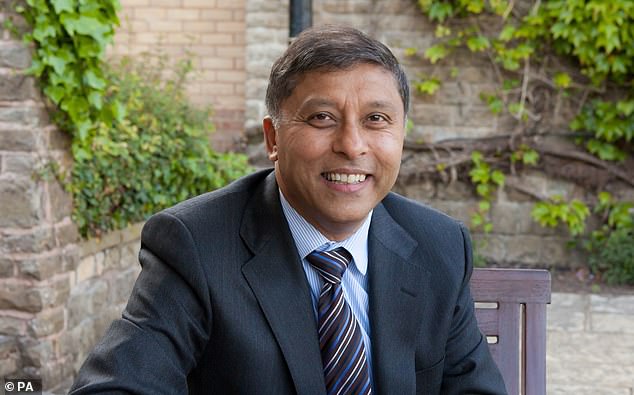Politicians don't value or understand retail, says M&S chief
Bosses from many of Britain's biggest retail chains have joined forces to call on the Government to provide urgent support to the High Street – including help with business rates and a crackdown on shoplifting.
Stuart Machin, chief executive of Marks & Spencer, said this weekend that politicians do not 'understand or appreciate' the importance of the retail sector to the economy.
He denounced the “inaction” and “increasing regulatory burden” in curbing investment in jobs and growth in the industry.
Marks & Spencer CEO Stuart Machin said politicians 'neither understand nor appreciate' the importance of the retail sector
His frustrations are echoed by Alex Baldock, CEO of electricity chain Currys.
Nish Kankiwala, chief executive of the John Lewis Partnership, called for a long-term growth plan and business rates reform.
Richard Walker, boss of Iceland's frozen food chain, said: “We need more sensible economic policies from the government that can bring a breath of fresh air to clean up the damage caused by high inflation.”
The heads of pharmacy chain Boots and the Co-op are both demanding stricter measures to combat shoplifting and violence against store staff.
Machin, who has led a revival of M&S's fortunes, told The Mail on Sunday: 'I don't feel that politicians understand or appreciate British retail, and that is a problem.
'It's a sector that employs more than 3 million people – that's 10 per cent of all jobs in Britain – and accounts for more than 5 per cent of our entire economy, paying £17 billion in business taxes.'
He added that easing these pressures would allow retailers to 'invest in jobs, in skills and in growth – the very things that will take the UK economy out of its sluggish path'.

Nish Kankiwala, CEO of the John Lewis Partnership, called for a long-term growth plan
Currys' Baldock said the High Street is facing a perfect storm of cost increases that could undermine the fight against inflation.
The national living wage for workers aged over 23 will rise by 9.8 per cent to £11.44 per hour from April. Those aged 21 and 22 will be paid the same for the first time, which amounts to an increase of 12.4 percent.
The pay rises come hand in hand with an increase of almost £500 million in business rates for the High Street.
Baldock said: “It will be counterproductive and keep inflation high for longer. It is not good for employment and investment. The retail sector is already overloaded.'
John Lewis Partnership's Kankiwala said: 'We need certainty and consistency to give businesses the confidence to invest. There needs to be a good plan for long-term growth that takes us beyond the political cycle.
'For retailers like the John Lewis Partnership, the tax burden needs to be fairer, so the Government must prioritize business rates reforms.'
Business rates, charged on commercial premises such as shops and pubs, are a major issue for retailers as they are based on property values rather than financial performance.
The levy has been repeatedly criticized for being outdated and unpredictable and for giving online retailers an advantage over physical High Street stores.
Many leading retailers also criticized the apprenticeship levy, which Machin described as a 'missed opportunity' to improve the skills of the UK workforce.
Co-op boss Shirine Khoury-Haq said the “current flawed system” for the apprenticeship levy meant £600m of funding had been sent back to the Treasury when it “could have been used for good”.
Khoury-Haq and Boots director Sebastian James were among a number of major retailers to highlight the need for action against shoplifting and attacks on store workers, which are on the rise this year.
Many leading retail bosses have backed the Mail's campaign to abolish the tourist tax, which requires foreign visitors to pay VAT on purchases made in Britain. This has so far fallen on deaf ears.

